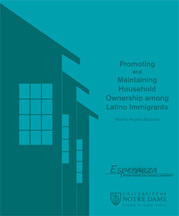
There is a cautiously optimistic view of homeownership prospects for Latino immigrants in the United States, according to a report released this month by the University of Notre Dames Institute for Latino Studies (ILS) and the nonprofit organization Esperanza.
The third in a 10-year study series, the report, titledPromoting and Maintaining Household Ownership Among Latino Immigrants,finds that examples of safe and fair mortgage lending programs that are responsive to the needs of immigrant Hispanic homebuyers do exist, but need to be better publicized and adopted by major mortgage lenders.
The study finds that between 1995 and 2005, the number of Hispanic owner-occupied homes increased by 81 percent, accounting for one quarter of the total increase in owner-occupied homes nationwide.Despite these impressive gains, Hispanic homeownership rates are far lower than for all groups.
Mortgage lenders that accept individual taxpayer identification numbers and the Matrícula Consular (identification cards offered by the governments of Mexico and other nations) have had very low foreclosure rates and have enabled many immigrants, without conventional forms of identification or experience in the U.S. banking system, to become homeowners.These and other practices geared toward the needs of non-traditional Hispanic homebuyers are used by a small, but growing number of lenders across the country and should become part of the mainstream mortgage industry, according to the report.
Other key findings include:
- Expensive sub-prime loans and other nontraditional mortgage products have aggressively been marketed to Hispanic homebuyers.Such loans likely have played a role in increasing Hispanic homeownership rates, but lax underwriting, predatory lending, and many Hispanic homebuyerslimited knowledge of mortgage lending practices have created excessive risk.* Hispanic immigrants need more information about proven mortgage lending programs specifically tailored to their needs and financial education so they can make informed decisions.* Programs aimed at increasing homeownership levels for immigrant Hispanics should be based on alliances among banks, government agencies and community organizations to provide the necessary elements for the most economically vulnerable members of the Latino immigrant community.
Founded in 1999, the ILS promotes understanding and appreciation of the social, cultural and religious life of U.S. Latinos by advancing research, expanding knowledge and strengthening community.
ILS publications are available on the Web at http://www.nd.edu/~latino/research/publications.htm
Esperanza is a faith-based organization committed to raising awareness and identifying resources that strengthen the Hispanic community.
_ Contact: Martha Martinez, Institute for Latino Studies fellow,_ " martinez.114@nd.edu ":mailto:martinez.114@nd.edu
TopicID: 23366